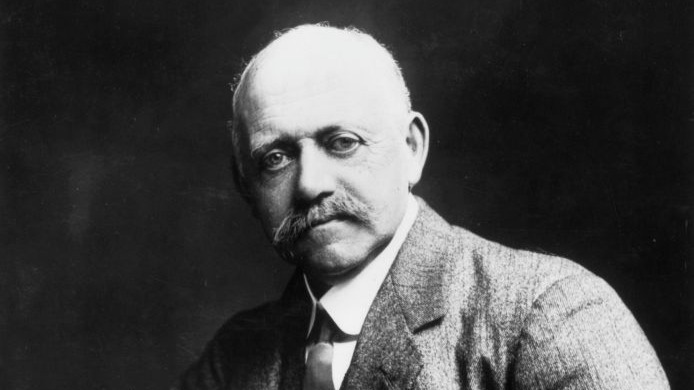21 May 1916: The first day of British Summer Time
For the first British Summer Time on this day in 1916, millions of Britons put their clocks forward an hour


Get the latest financial news, insights and expert analysis from our award-winning MoneyWeek team, to help you understand what really matters when it comes to your finances.
You are now subscribed
Your newsletter sign-up was successful
Want to add more newsletters?

Twice daily
MoneyWeek
Get the latest financial news, insights and expert analysis from our award-winning MoneyWeek team, to help you understand what really matters when it comes to your finances.

Four times a week
Look After My Bills
Sign up to our free money-saving newsletter, filled with the latest news and expert advice to help you find the best tips and deals for managing your bills. Start saving today!
Wishing to prolong a round of golf is an odd reason for putting the entire country to the bother of remembering to put their clocks forward an hour every spring. But that, so it is said, was behind William Willett's campaign to introduce British Summer Time (BST). The other, far more likely reason, was to make the most of the daylight hours and increase British productivity.
It was Benjamin Franklin who first toyed with the idea of “daylight saving time”. In a letter to the Journal of Paris in 1784, he mused over how much he would save on candles by putting his clock forward in the warmer months and getting out of bed earlier.
But it was only with the dawn of the 20th century that the idea really saw the light of day. In 1907, Willett wrote a pamphlet, A Waste of Daylight. In it, he argued that the clocks should be advanced by 80 minutes, in 20-minute increments, in April in order to make the most of the longer evenings.
MoneyWeek
Subscribe to MoneyWeek today and get your first six magazine issues absolutely FREE

Sign up to Money Morning
Don't miss the latest investment and personal finances news, market analysis, plus money-saving tips with our free twice-daily newsletter
Don't miss the latest investment and personal finances news, market analysis, plus money-saving tips with our free twice-daily newsletter
Yet, it was the Germans that finally persuaded the government to act in 1916 – too late for poor, old Willett, who died the year before. It was they, and the Austro-Hungarians, who put their clocks forward to increase factory time. Not to be outdone by these time-fiddlers, with whom Britain was at war, the British followed suit on 21 May 1916.
During the Second World War, British Summer Time was advanced by two whole hours, but the idea tended to prove unpopular with those living further north (nobody likes getting up in the dark after all). With the war won, BST returned to just one hour ahead of Greenwich Mean Time.
Proposals to again put BST forward by two hours resurfaced as recently as 2011. The "Lighter later" campaign argued that it would boost Britain's economy by £3.5 billion – largely down to the extra tourism it would attract (meaning more time spent at the bar). But those Scots who prefer not to live in darkness can rest easy. That idea has been put to bed. At least for now.
Get the latest financial news, insights and expert analysis from our award-winning MoneyWeek team, to help you understand what really matters when it comes to your finances.

-
 Average UK house price reaches £300,000 for first time, Halifax says
Average UK house price reaches £300,000 for first time, Halifax saysWhile the average house price has topped £300k, regional disparities still remain, Halifax finds.
-
 Barings Emerging Europe trust bounces back from Russia woes
Barings Emerging Europe trust bounces back from Russia woesBarings Emerging Europe trust has added the Middle East and Africa to its mandate, delivering a strong recovery, says Max King
-
 31 August 1957: the Federation of Malaya declares independence from the UK
31 August 1957: the Federation of Malaya declares independence from the UKFeatures On this day in 1957, after ten years of preparation, the Federation of Malaya became an independent nation.
-
 13 April 1960: the first satellite navigation system is launched
13 April 1960: the first satellite navigation system is launchedFeatures On this day in 1960, Nasa sent the Transit 1B satellite into orbit to provide positioning for the US Navy’s fleet of Polaris ballistic missile submarines.
-
 9 April 1838: National Gallery opens in Trafalgar Square
9 April 1838: National Gallery opens in Trafalgar SquareFeatures On this day in 1838, William Wilkins’ new National Gallery building in Trafalgar Square opened to the public.
-
3 March 1962: British Antarctic Territory is created
Features On this day in 1962, Britain formed the British Antarctic Territory administered from the Falkland Islands.
-
10 March 2000: the dotcom bubble peaks
Features Tech mania fanned by the dawning of the internet age inflated the dotcom bubble to maximum extent, on this day in 2000.
-
9 March 1776: Adam Smith publishes 'The Wealth of Nations'
Features On this day in 1776, Adam Smith, the “father of modern economics”, published his hugely influential book The Wealth of Nations.
-
 8 March 1817: the New York Stock Exchange is formed
8 March 1817: the New York Stock Exchange is formedFeatures On this day in 1817, a group of brokers moved out of a New York coffee house to form what would become the biggest stock exchange in the world.
-
7 March 1969: Queen Elizabeth II officially opens the Victoria Line
Features On this day in 1969, Queen Elizabeth II took only her second trip on the tube to officially open the underground’s newest line – the Victoria Line.